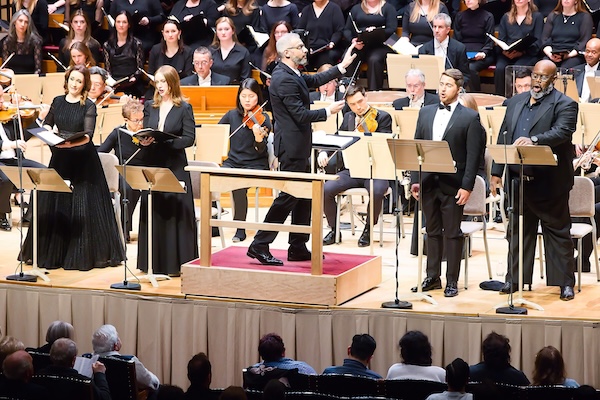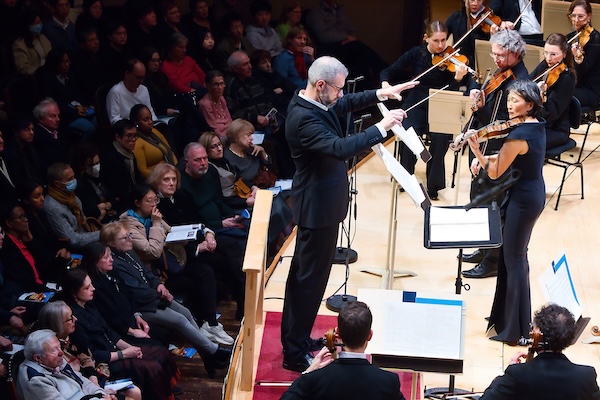Concert Review: The Boston Symphony Orchestra Plays Mozart and Arvo Pärt
By Aaron Keebaugh
Guest conductor Dima Slobodeniouk and the Boston Symphony Orchestra invited listeners to a meditative evening of music.

Dima Slobodeniouk conducts the Boston Symphony Orchestra with soloists Erin Morley, Avery Amereau, Jack Swanson, and Morris Robinson. Photo: Hilary Scott
How can a Requiem be so upbeat?” one listener quipped after the Boston Symphony Orchestra’s concert last Thursday night.
Sure, given the brisk tempos and powerful intensity that guest conductor Dima Slobodeniouk pulled from the large forces packed onto the Symphony Hall stage, Mozart’s Requiem, the centerpiece of last weekend’s program, conveyed unexpected exuberance. After all, the work, left incomplete with Mozart’s sudden death in December of 1791, was intended to go in a bold new direction — it eschewed operatic grandeur in favor of emotional directness. Still, even though he was tuned into the piece’s unapologetic fervor, it took some time for Slobodeniouk to delve into the mystery that’s etched into this score.
From the get-go, last week’s performance was all power and punch. Brisk tempos made the phrases of the opening “Requiem aeternam” come across with more weight than sweep. But that devil-may-care approach generated fiery intensity in the fugal lines of the ensuing “Kyrie,” with the Tanglewood Festival Chorus singing with bold conviction.
The hellfire and terror of “Dies irae” was aptly conveyed. The “Confutatis” was also well served; its accents drummed like hammer strokes. Yet the effect never surrendered to monochrome. Slobodeniouk explored each phrase through wide contrasts in dynamics, a seesaw approach that made the “Domine Jesu” feel as immediate as an impassioned prayer.
By mid-work, the conductor and his forces found an equilibrium, relaxing a bit on the delicate moments. The “Voca me,” sung by the TFC’s sopranos and altos, delivered momentary solace. The “Salva me” glowed with sudden warmth, and the chorus tapped into the abundant pathos etched into the “Recordare.” Topping it off was the deftly repressed “Lacrimosa,” whose lines and harmonies flickered as if at a distance.
The lush sonorities of the orchestra provided ample support for the vocal soloists, who ranged from capable to excellent. Soprano Erin Morley sang with feathery delicacy in her featured moments, though her voice was often overpowered by the orchestra. Mezzo-soprano Avery Amereau sang with a rich, dark tone and incisive diction. Tenor Jack Swanson added a beaming counterweight to the mix, while bass-baritone Morris Robinson anchored the quartet with a cavernous voice that emitted palpable intensity. His singing in the “Tuba mirum” supplied all the fiery exuberance of a country preacher’s sermon.

Dima Slobodeniouk conducts the Boston Symphony Orchestra, Alexander Velinzon, and Lucia Lin in Arvo Pärt’s Tabula Rasa. Photo: Hilary Scott
Arvo Pärt’s Tabula Rasa, heard in the concert’s first half, balanced intensity with serenity. A concerto for two violins, string orchestra, and prepared piano (made to sound like chimes), the composition unfolds like a messaging ritual whose repetitions invite drifting into deep contemplation. The music is deceptively simple. In the first of its two movements, strings spin out a series of figures that are interrupted by sudden pauses that leave the solo lines to float freely. The second movement is a long-breathed series of simple chords unfolding over a bass line that stretches itself out with every new refrain. And the gravitas builds gradually — the music never reaches a frenzy.
Slobodeniouk led the strings with monk-like focus and concentrated control. The strings rarely registered above a mezzo forte. But they delivered just enough force to gently nudge subtle phrases from soloists Alexander Velinzon and Lucia Lin. It was like a breeze lifting feathers of sound, the lines tumbling and turning in new directions. This is contemplative music, and the musicians soulfully conveyed its solemn invitation to meditate on the path to abiding peace.
Aaron Keebaugh has been a classical music critic in Boston since 2012. His work has been featured in the Musical Times, Corymbus, Boston Classical Review, Early Music America, and BBC Radio 3. A musicologist, he teaches at North Shore Community College in both Danvers and Lynn.
Tagged: Avery Amereau, Boston Symphony Orchestra, Dima Slobodeniouk, Erin Morely, Jack Swanson
